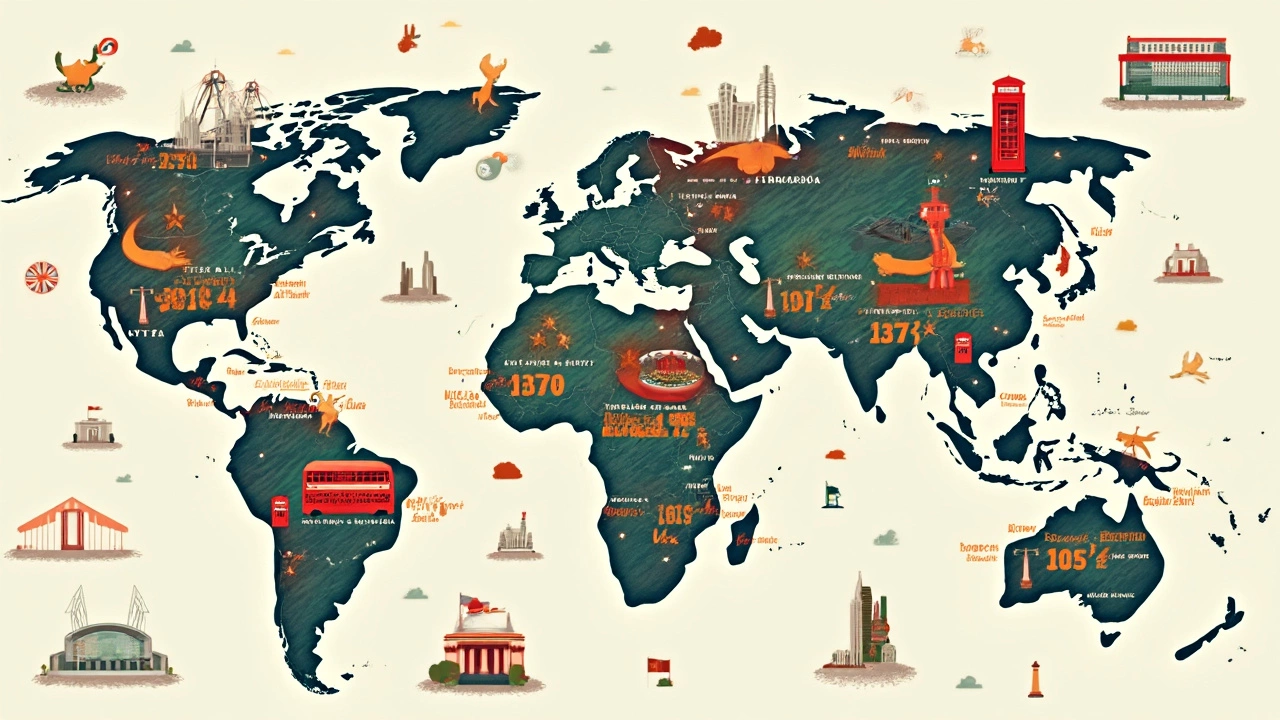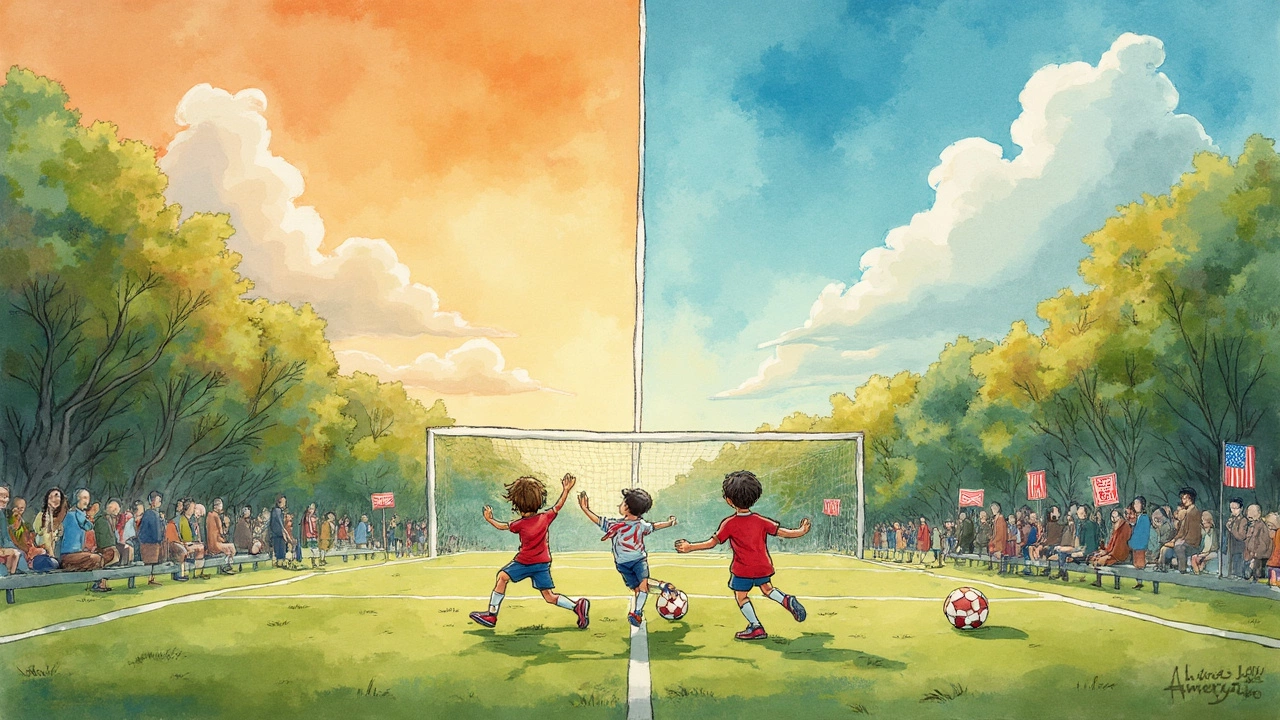Football or Soccer? Understanding What the Sport Is Really Called

Ever heard people argue over whether it's called football or soccer? This can get pretty heated, especially when friends and family from different countries start tossing opinions around. The truth is, there’s an official answer, but it’s not as simple as you’d expect.
Globally, FIFA—the sport’s governing body—calls it “association football.” But if you ask someone in the UK or pretty much any other country outside North America, they'll just say “football.” Head to the US, Canada, or Australia, and suddenly people call it “soccer.” It’s not just about tradition; it’s also about avoiding mix-ups with their own versions of football, like American or Australian rules football.
This split isn’t only about words—it comes from real differences in how people grew up playing and watching different games. My daughter Antonia even told me her school coach got a little flustered once when she called it football instead of soccer at practice. She’s not alone. Loads of folks get tripped up by this when chatting online or while traveling.
- Official Names Around the World
- Who Decides What It's Called?
- The Origins of the Names
- Why the Confusion Persists
- Tips for Talking About Football (or Soccer)
Official Names Around the World
Walk into a stadium in most countries, and ask people what the game is called—they’ll say “football” without skipping a beat. In fact, according to FIFA, more than 90% of the countries that play the game use “football” or their local word for it, like “fútbol” in Spain, “futebol” in Brazil, or “fußball” in Germany.
Now, flip over to the football matches in the United States, Canada, and a few others like Australia and New Zealand—you’ll hear “soccer” instead. The reason? In these countries, “football” usually means something very different: American football in the US, Canadian football up north, and Australian rules football in Australia. To avoid mixing things up, “soccer” stuck as the go-to label for the world’s biggest sport.
- United Kingdom: "football"
- Spain: "fútbol"
- Italy: "calcio"
- Germany: "fußball"
- Brazil and Portugal: "futebol"
- France: "football" (pronounced differently, of course)
- United States and Canada: "soccer"
- Australia and New Zealand: "soccer"
Here’s a quick look at how different countries refer to the game:
| Country | Common Term |
|---|---|
| England | Football |
| USA | Soccer |
| Japan | サッカー (Sakkā) |
| Italy | Calcio |
| Mexico | Fútbol |
| Australia | Soccer |
| Germany | Fußball |
What’s interesting is that international bodies like FIFA, UEFA, and even the Olympics all use “football” in official documents, no matter what word fans use at home. That’s why you’ll see teams like the “Football Association” in England and the “Confederation of African Football.” But don’t get too caught up—if you use either term in a conversation, odds are people will know exactly what you mean.
Who Decides What It's Called?
This isn't some random choice made by a few people yelling at each other in a pub. The main group with the power to set the official name is FIFA—the International Federation of Association Football. This global organization runs the World Cup, controls the rules, and basically acts as the top boss for how “football” is labeled in official matches and events worldwide.
But FIFA isn’t the only game in town. Each country has its own football association. For example, in England, it’s called The Football Association (FA). In the US, you have the United States Soccer Federation (USSF). These groups handle their own naming decisions locally to fit what keeps things simple and clear for their fans. Here’s a look at some of the top associations:
| Country | Governing Body Name | What They Call It |
|---|---|---|
| England | The Football Association (FA) | Football |
| United States | United States Soccer Federation (USSF) | Soccer |
| Australia | Football Australia | Football/Soccer |
| Japan | Japan Football Association | Soccer (Sakkā) |
The reason there isn’t one answer everywhere is because these organizations want to avoid confusion. In the US, for instance, “football” already means the NFL version, so calling it “soccer” just makes life easier. Meanwhile, if you say “soccer” in most of Europe, people will give you that look—like you asked for ketchup on pasta.
The Oxford English Dictionary backs this up. As sports historian David Goldblatt put it:
"The division between ‘football’ and ‘soccer’ reflects the way cultures, not dictionaries, control language."
So really, it’s a mix of global standard setters like FIFA and local associations that settles the name. They shape what’s on the league signs, TV broadcasts, and even what little kids say when they lace up their boots.

The Origins of the Names
If you’re wondering why people can’t agree whether it’s football or soccer, it all starts with how the game took shape in the 1800s. Back in England, different schools played different kinds of football. Some allowed handling the ball; others didn’t. To make things less confusing, the word “association football” was created in 1863, so folks could tell it apart from “rugby football.”
The word “soccer” actually comes from this too. People in British universities loved using slang and shortening words. So they took “association” and made it “assoc,” then turned that into “soccer.” The word really took off in England before showing up in places like the United States, Canada, and Australia, where there were already other sports called football. It was never meant as a joke or insult—just classic, quirky student slang.
Here’s a cool fact: in the early 20th century, even Brits regularly used “soccer” and “football” almost interchangeably. It was only after World War II that “soccer” became a mostly North American thing, while “football” settled in as the default everywhere else.
The main reason for the name split is that “football” already meant something totally different in the US and Australia. While FIFA and international groups landed on football as the official name, countries stuck to names that made sense for their local sports scene. If you ever felt lost in this naming mess, you’re not the only one.
| Country | Common Name | Other Major Football Code |
|---|---|---|
| England | Football | Rugby |
| United States | Soccer | American Football |
| Australia | Soccer | Australian Rules Football |
| Spain | Fútbol | - |
So next time you hear someone say "soccer," know it’s not just an American thing—it actually started out in England as a way to keep things clear. Names stick because of history and habit, not because there’s one right choice.
Why the Confusion Persists
This whole naming mess didn’t just pop up overnight. The main reason for the never-ending debate is that different countries developed their own sports and wanted a unique name to keep things clear. For example, in the United States, “football” usually means American football, so calling the global game "soccer" saves everyone from mixing up the two completely different sports.
Back in the late 1800s in England, people also used the word "soccer"—it came from "association football" by chopping out part of the word and adding “-er.” The British actually used “soccer” a lot up until the 1970s. Then, as American football got even more popular in the US, Americans stuck with “soccer” to stay different. Brits, meanwhile, went back to just calling it "football." That’s why you end up with headlines about the same World Cup being played in different sports, depending on which country you’re in.
- Language habits are stubborn. Once entire countries get used to a word, it sticks, even if everyone knows it means the same game.
- Media makes it confusing, too. International matches often flip between names depending on the broadcaster.
- Even google search results change based on your location; try searching for "football" in England versus the US and you’ll get a totally different homepage.
Here's a quick look at how naming splits by region:
| Country/Region | Main Name Used |
|---|---|
| United Kingdom | Football |
| United States | Soccer |
| Australia | Soccer (but changing) |
| Brazil, Germany, etc. | Futebol/Fußball (translation of football) |
Ask any fan what their favorite game is called at home and you’ll probably hear some passionate answers. That’s why confusion about football vs. soccer isn’t going anywhere—people just won’t let their favorite version of the name go.

Tips for Talking About Football (or Soccer)
This name game can get awkward, so here are some easy ways to avoid confusion and sound like you know what you’re saying in any country. It comes down to being aware of your audience and context, especially when chatting about football with friends worldwide or posting online.
- Check who you’re talking to: If you’re chatting with someone from the US or Canada, “soccer” is the term they’ll expect. If they’re from England, Spain, or most of the world, just stick with “football.”
- Be extra clear when you’re traveling or working with an international group: Don’t just say “football”—specify “association football” the first time, or mention “the World Cup type of football.” That way, nobody thinks you mean American or Australian football.
- Online, add a location cue: Drop “UK football” or “US soccer” in your message if you notice confusion. Everyone will instantly get what you mean. Most major sports websites now use both terms in headlines to catch everyone’s searches.
- Know the official terms: FIFA and most global tournaments always use “association football.” If you’re referencing a FIFA rule or stat, use that exact phrase to avoid mix-ups.
- Stay cool about the name: Folks may poke fun or insist their way is “right.” It’s not worth an argument—both names are historically correct in the right countries.
Just how split is the world? Check the table below for the most-used term by country. You’ll see why so many people get mixed up.
| Country | Most-Used Term |
|---|---|
| England/Germany/Spain/FIFA events | Football |
| USA/Canada | Soccer |
| Australia (older generations) | Soccer |
| Australia (official since 2004) | Football |
My kid Antonia once called it “football” in her Canadian school, and her friends thought she meant the game with helmets. It turned into a mini history lesson—which is honestly a win for everyone. Bottom line: a bit of context saves confusion and keeps the conversation friendly.


